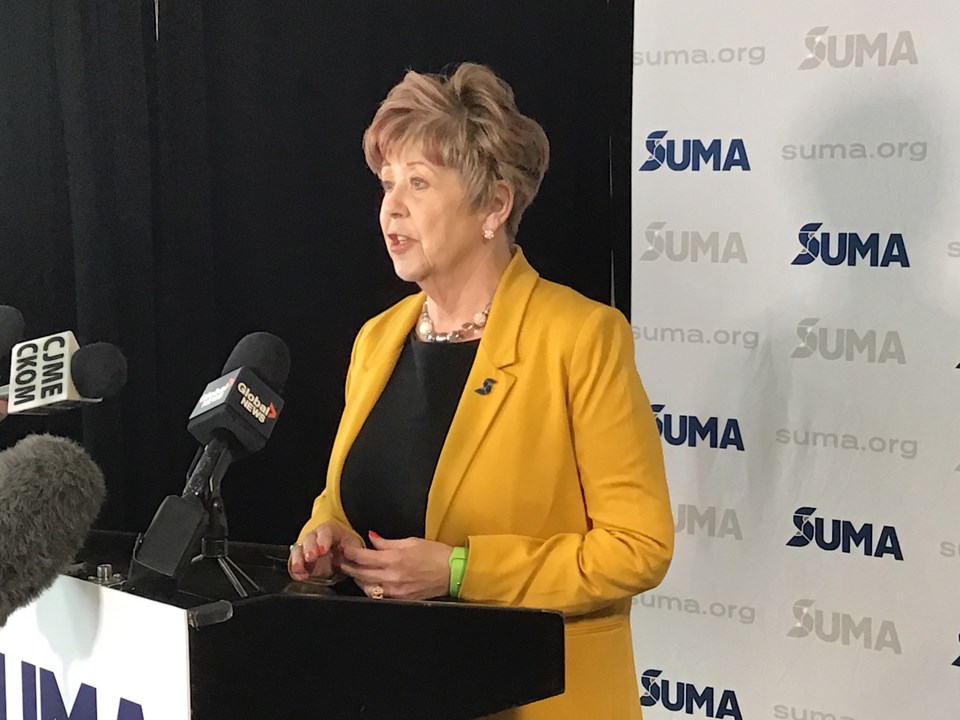REGINA - The Saskatchewan Urban Municipalities Association convention is over for 2024, and the general reaction has been positive from the leaders attending in Regina from urban municipalities.
That is what Randy Goulden, President of SUMA and a Yorkton councillor, indicated to reporters Wednesday.
“They’re very very pleased with the discussion they’ve had, the engagement they’ve had with SUMA with our Board of Directors but also with provincial government and the leaders that have taken time to come and have those discussions with them. Many many times, those leaders don’t get those opportunities. Perhaps I’ve been more fortunate with my role, but I do have those opportunities but it’s so good to see provincial government here and answering the questions to some of the decisions they might’ve made — but also to understand what the needs are in our communities. So we are very pleased with the last four days.”
The convention included addresses from Premier Scott Moe and Minister of Government Relations Don McMorris, as well as dialogue sessions and the final Bear Pit session with cabinet ministers on Wednesday.
There was also a strong Opposition presence during the week as NDP Leader Carla Beck gave her address on Tuesday morning.
As for the top issues spoken about most by the delegates from the various cities, towns and villages from across Saskatchewan at the convention, Goulden pointed to three.
“The first one I would say is infrastructure. And I think you’ve heard of that come clear in the Bear Pit, clear with the dialogue with ministers. Our residents expect when they are living in our urban communities — it . does not matter whether is urban communities, or what size — they expect clean drinking water, they expect wastewater to be looked after, the drainage looked after. Then we have quality of life facilities like rinks, and pools, and so no matter where I go around this province that’s what I hear.
"The other, and you’ve heard it here quite clearly too, is mental health and addiction. That is not a responsibility of our urban communities. That is not in any Acts, that is not in any responsibility for you. But this is happening in our communities. So we need to work with our provincial government and our federal government to provide the very best places they can live.
"And the third --- public safety. We’ve heard that, and we thank the ministers that came to the dialogue and through these past few days, and certainly there is concern around the number of officers in our communities, and some of the decreases that we’ve seen. We have great distances between detachment that are patrolling our small urban communities, so that was definitely one. And some of that related to around mental health and addictions too, because we know that not everyone is ready for treatment. We are encouraged and we appreciate what is being done for those additional treatment beds in our province, but those that aren't ready for that, they’re staying in there living on the streets and near our businesses and near homes and schools. So that was also a concern."
Goulden pointed in particular for the need for infrastructure for growth and to increase the economy.
“These communities are growing and they need to have wastewater and water for any industries coming. My city, the city of Yorkton is desperately needing a new water treatment plant so we can continue to provide canola crushing. We provide more canola in the city of Yorkton than all of the United States does. So those are the things, but each community would be unique depending on the priorities and where the need was. Our communities are working very very well at understanding their asset management and what’s next on the list, and what’s critical. And I have to say that although I can speak for my community, I can speak for communities across the province in saying there’s a great deal of need, and we have to start working even harder -- because we have been working -- but even harder with the provincial and the federal governments."





